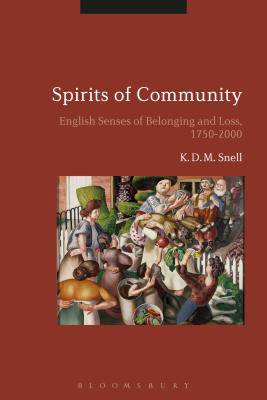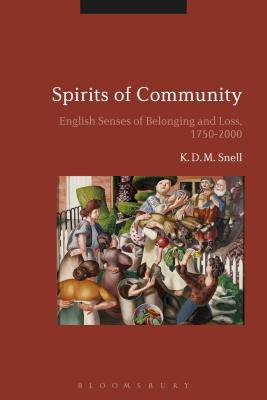
Bedankt voor het vertrouwen het afgelopen jaar! Om jou te bedanken bieden we GRATIS verzending (in België) aan op alles gedurende de hele maand januari.
- Afhalen na 1 uur in een winkel met voorraad
- In januari gratis thuislevering in België
- Ruim aanbod met 7 miljoen producten
Bedankt voor het vertrouwen het afgelopen jaar! Om jou te bedanken bieden we GRATIS verzending (in België) aan op alles gedurende de hele maand januari.
- Afhalen na 1 uur in een winkel met voorraad
- In januari gratis thuislevering in België
- Ruim aanbod met 7 miljoen producten
Zoeken
€ 296,95
+ 593 punten
Uitvoering
Omschrijving
Concern about the 'decline of community', and the theme of 'community spirit', are internationally widespread in the modern world. The English past has featured many representations of declining community, expressed by those who lamented its loss in quite different periods and in diverse genres. This book analyses how community spirit and the passing of community have been described in the past - whether for good or ill - with an eye to modern issues, such as the so-called 'loneliness epidemic' or the social consequences of alternative structures of community.
It does this through examination of authors such as Thomas Hardy, James Wentworth Day, Adrian Bell and H.E. Bates, by appraising detective fiction writers, analysing parish magazines, considering the letter writing of the parish poor in the 18th and 19th centuries, and through the depictions of realist landscape painters such as George Morland. K. D. M. Snell addresses modern social concerns, showing how many current preoccupations had earlier precedents. In presenting past representations of declining communities, and the way these affected individuals of very different political persuasions, the book draws out lessons and examples from the past about what community has meant hitherto, setting into context modern predicaments and judgements about 'spirits of community' today.
It does this through examination of authors such as Thomas Hardy, James Wentworth Day, Adrian Bell and H.E. Bates, by appraising detective fiction writers, analysing parish magazines, considering the letter writing of the parish poor in the 18th and 19th centuries, and through the depictions of realist landscape painters such as George Morland. K. D. M. Snell addresses modern social concerns, showing how many current preoccupations had earlier precedents. In presenting past representations of declining communities, and the way these affected individuals of very different political persuasions, the book draws out lessons and examples from the past about what community has meant hitherto, setting into context modern predicaments and judgements about 'spirits of community' today.
Specificaties
Betrokkenen
- Auteur(s):
- Uitgeverij:
Inhoud
- Aantal bladzijden:
- 360
- Taal:
- Engels
Eigenschappen
- Productcode (EAN):
- 9781474268844
- Verschijningsdatum:
- 16/06/2016
- Uitvoering:
- Hardcover
- Formaat:
- Genaaid
- Afmetingen:
- 155 mm x 236 mm
- Gewicht:
- 680 g

Alleen bij Standaard Boekhandel
+ 593 punten op je klantenkaart van Standaard Boekhandel
Beoordelingen
We publiceren alleen reviews die voldoen aan de voorwaarden voor reviews. Bekijk onze voorwaarden voor reviews.









